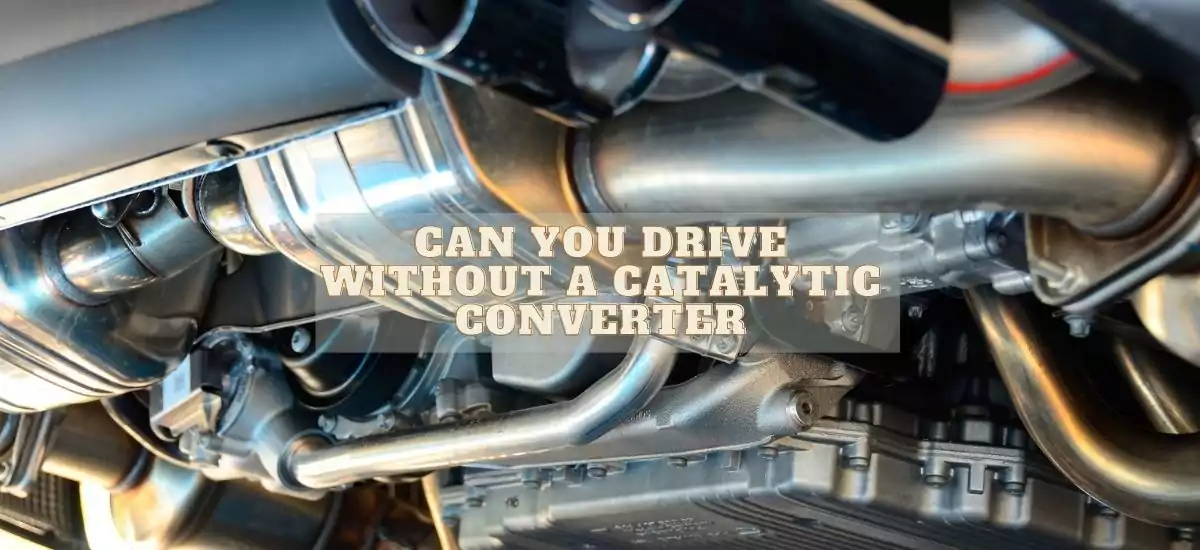Can You Drive Without A Catalytic Converter: Answer Is Yes You can still drive your vehicle if your catalytic converter is broken or stolen. However, the mere fact that you can travel without a catalytic converter does not imply that you should.
Before 1975, catalytic converters were not a typical component of automobile exhaust. So many classic and antique vehicles are still on the road proving that vehicles can function adequately without them.
Nevertheless, there are disadvantages to driving without a catalytic converter. However, before we delve into that, let’s review the fundamentals.
Can A Car Run Without A Catalytic Converter?
Yes, driving without a catalytic converter is generally acceptable if it is replaced by an exhaust pipe or another suitable option. You will not damage your vehicle, but you may break the law depending on where you travel.
There are numerous instances in which you may be required to drive without a catalytic converter, even for a short period.
Most catalytic converters are made to last the vehicle’s lifespan. If your engine is running too rich, or if the exhaust gases contain oil, petrol, or even coolant, the catalytic converter may become damaged or clogged, and it will be required to repair it.
Typically, catalytic converters consist of platinum, palladium, and rhodium. These metals are essential for oxidizing and purifying carbon monoxide and hydrocarbons.
Can You Drive A Car Without A Catalytic Converter?
Yes, it is possible to drive without a catalytic converter. The following inquiry you should make is, “Is driving without a catalytic converter illegal?” Do you reside in a region where driving without a catalytic converter is prohibited? Then you will likely fail an emissions test without one.
How Long Can You Drive Without A Catalytic Converter?
Because catalytic converters are frequently removed, you can drive without one indefinitely. However, you should call your insurance company immediately if the converter was stolen, as your policy may cover the replacement cost.
What Happens If You Remove The Catalytic Converter?

Even while it is theoretically possible to drive without a catalytic converter, your vehicle will not perform as well as it did previously. Expect the following if your catalytic converter is eliminated:
Check Engine Light And Engine Error Codes.
The catalytic converter is an essential component of the exhaust system, and its performance is evaluated by one or more post-cat oxygen sensors installed in the exhaust. Hydrocarbons and carbon monoxide concentrations will rise when exhaust fumes are no longer filtered.
The oxygen sensors post-cat will detect this change and transmit a signal to the ECU to adjust the fuel mixture. This will typically activate the check engine light and generate engine trouble code P0420, which signals a catalytic converter malfunction.
Modifications To The Exhaust Sound
The catalytic converter helps to reduce the volume of exhaust noise. Without it, the noise from the exhaust will be significantly louder and raspier.
If the cat is replaced with a correctly fitted section of the exhaust pipe or a comparable pipe, the noise will be less severe but still louder than before.
Modifications To Fuel Economy And Engine Performance
When the ECU senses a change in the exhaust gases, it will either increase or decrease the amount of fuel in each cylinder to rectify the condition.
In most contemporary automobiles, removing the catalytic converter will increase hydrocarbons and carbon monoxide, which cannot be mitigated by adjusting the fuel mixture.
This will typically compel the ECU to resort to a default fuel-to-air ratio in response to the oxygen sensor’s out-of-range warnings, which will impair overall fuel economy.
If the check engine light illuminates, the engine’s performance may also suffer since the ECU may restrict available power until the problem is resolved.
What To Do If The Catalytic Converter Is Stolen?

Theft of catalytic converters is a persistent problem no matter where you live. The primary reason is that they are composed of extremely valuable components. These materials, including platinum and rhodium, are highly valued in any scrap shop. The converter is composed of various precious metals and pricey substances depending on the automobile.
This is a major reason why vehicles with higher ground clearance, like SUVs, are more prevalent targets. Criminals can gain access to the catalytic converters of these vehicles.
How Loud Is A Car Without A Catalytic Converter?
When driving without a catalytic converter, your car will sound roaring, especially when starting or accelerating.
FAQS
1. Do all cars have catalytic converters?
Not every car has a catalytic converter. Catalytic converters are only required for combustion engine cars, especially those manufactured after the 1970s, to transform harmful emissions into innocuous gases. They will not be found in electric vehicles, but hybrids will have them.
2. How Long Can I Go Without Replacing The Catalytic Converter?
The catalytic converter, which transforms dangerous emissions into safe gas, typically lasts 10 years or longer and should only be updated when necessary. It can get clogged, actually damaged, or oil or engine coolant polluted. Moreover, it can overheat.
3. Does Removing The Catalytic Converter Damage The Engine?
Due to the restrictive design of the catalytic converter, the engine must work harder to produce the same amount of energy as it would without the device. Its removal reduces this weight, allowing the engine to function substantially better without exerting as much effort.
4. Why Do Catalytic Converters Get Stolen?
Thieves seek catalytic converters because the metals contained within them are valuable. Typically, catalytic converters consist of three gold bullion: platinum, palladium, and rhodium. The cost of all three metals has increased dramatically in the past ten years.
Check More Posts:-

